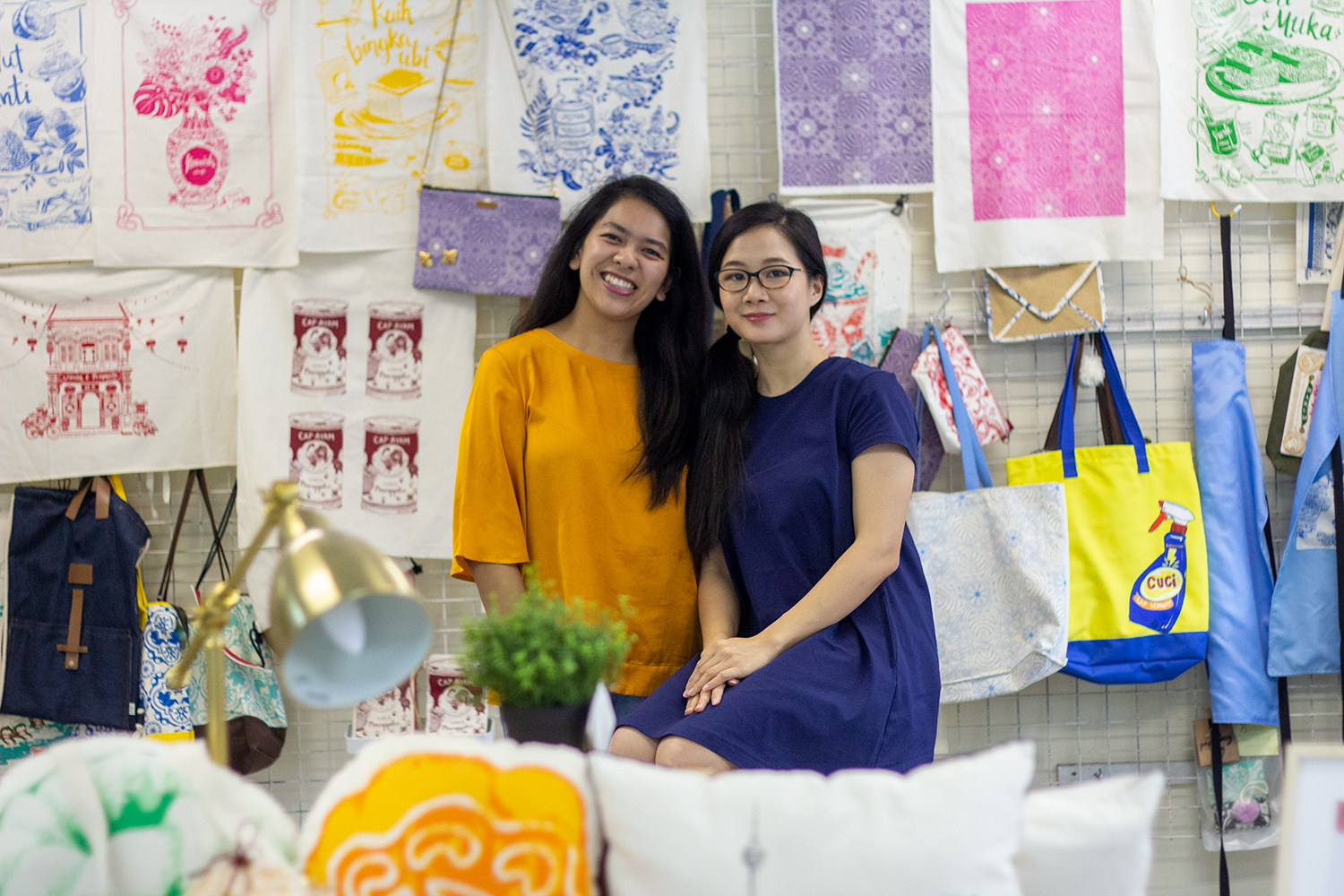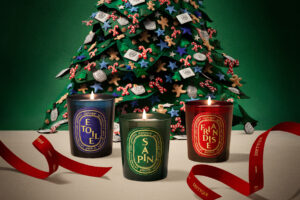During these difficult times, livelihoods have been affected, businesses are disrupted and dreams, diminished on a global scale. FirstClasse, in collaboration with Newswav, wants to help provide some much needed publicity to local businesses going through tough times with this latest #SupportLocal series. Visit our #SupportLocal page for more information.
Bingka is a brand that cherishes the little things that make Malaysians, Malaysians – immortalising them into keepsakes that remind you of home.
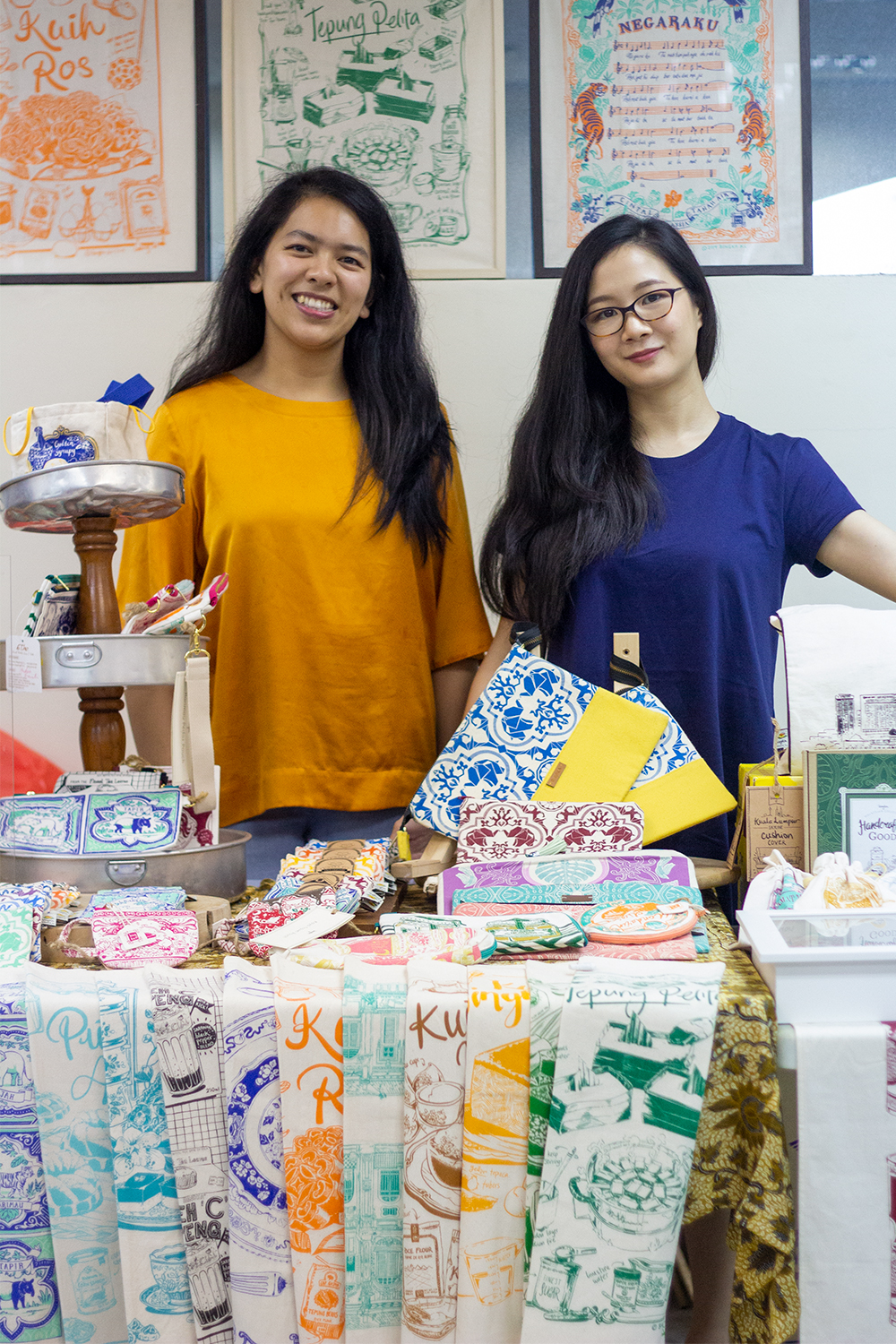
What are a few things that come to mind of when it comes to Malaysian souvenirs? The usual culprits are probably batik, pewter and woven handicrafts. While these are representative of our history and heritage in their own right, there’s so much more to us Malaysians that deserve to be celebrated and remembered.
Think our architecture that spans from humble kampung houses to the imposing Petronas Twin Towers; our rich, natural diversity of flora and fauna; and of course, our food – whether it’s a popular national dish like nasi lemak or a tea time classic like the kuih bingka.
Enter a local boutique souvenir label named after that last Malaysian dessert: Bingka, founded by childhood friends Adrihana Abdul Rashid and Emmalynn Yam in 2015. This is a brand that cherishes the little things that make Malaysians, Malaysians – immortalising elements like Teh C Peng, Cendol and Harimau Malaysia in keepsake tea towels, tote bags or pillows that remind you of home.
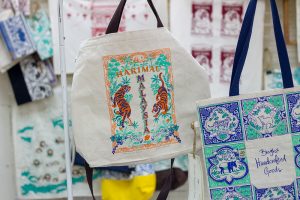 “For me, being Malaysian means being appreciative and celebrating what we’ve got going for us – whether it’s our people, our culture, our heritage, our food,” Emma observes, as Adrihana swiftly chimes in, “which I feel like maybe not a lot of Malaysians have that – where we can easily say ‘why am I proud to be Malaysian’, besides just the food. What we want to do is basically to keep our culture and heritage alive and bring it forward to the younger generation who may not really know or understand it.”
“For me, being Malaysian means being appreciative and celebrating what we’ve got going for us – whether it’s our people, our culture, our heritage, our food,” Emma observes, as Adrihana swiftly chimes in, “which I feel like maybe not a lot of Malaysians have that – where we can easily say ‘why am I proud to be Malaysian’, besides just the food. What we want to do is basically to keep our culture and heritage alive and bring it forward to the younger generation who may not really know or understand it.”
Of silkscreen printing and souvenirs
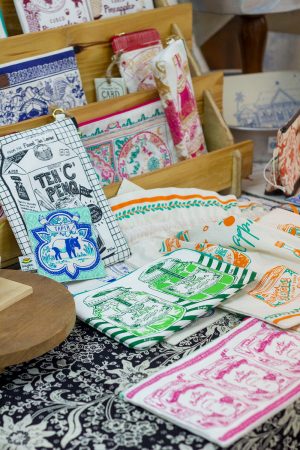 Before Bingka was born, Adrihana and Emma – formerly a mechanical engineer and a visual effects artist, respectively – had initially thought of exploring batik.
Before Bingka was born, Adrihana and Emma – formerly a mechanical engineer and a visual effects artist, respectively – had initially thought of exploring batik.
“After a few rounds of trying batik on our own, we felt that it was too difficult and too costly, so we thought of trying silkscreen printing,” Adrihana tells. “With silk screens, you can take whatever designs you have done and print it quite easily, like overnight or in one day. From there, we learnt to silkscreen print ourselves. It took us about a year of trial and error before we decided it was what we wanted to do.”
Settling on silkscreen printing offered the duo the creativity and flexibility they needed to bring their one-of-a-kind ideas to life. Thus came their very first launch: tea towels, which Adrihana, who oversees production and operation, calls “a thorn in her side.”
“When I told some of our friends we were thinking of selling tea towels, they said that people weren’t going to buy them and we were going to waste our time, our effort, our money,” she recalls, “but I thought the far-reaching, world-savvy market would understand and appreciate what tea towels are.”
“Then when we launched, people were telling us they love how it reminded them of a time they spent overseas, but with a Malaysian touch. That was when we knew we were on the right track.”
“For me, being Malaysian means being appreciative and celebrating what we’ve got going for us – whether it’s our people, our culture, our heritage, our food.” – Emmalynn Yam
Today, every product by Bingka has a unique aesthetic that one can instantly connect to the brand. Take for instance, the Cendol Raya collection launched in conjunction with the festivity – where various forms of the iced sweet dessert adorn placemats, pouches, coasters and more in the brand’s signature whimsical style.
Emma, who has worked on Hollywood blockbusters like Life of Pi, is to credit for the brand’s quirky, unconventional designs. When asked to describe the Bingka aesthetic, she explains: “We knew that our products had to be handmade, and they had to be handmade in Malaysia. I wanted our designs to reflect that as well, so our aesthetic tends to look very hand-drawn.
“It’s got a lot of textures in it; it doesn’t look too straight or too clean in terms of the lines or shapes. There’s always a bit of roughness to it. Sometimes there’ll be blotches here and there but it’s actually quite intentional,” she elaborates, beaming ever so slightly.
What’s her personal favourite? “The Negaraku tea towel. When Adri suggested it, I thought that was crazy because I’ve never seen anyone doing it… But I tried to find ways to make it work and to include the lyrics without making it look too corny. Now it’s actually our best-selling collection,” she regales, betraying a hint of amazement.
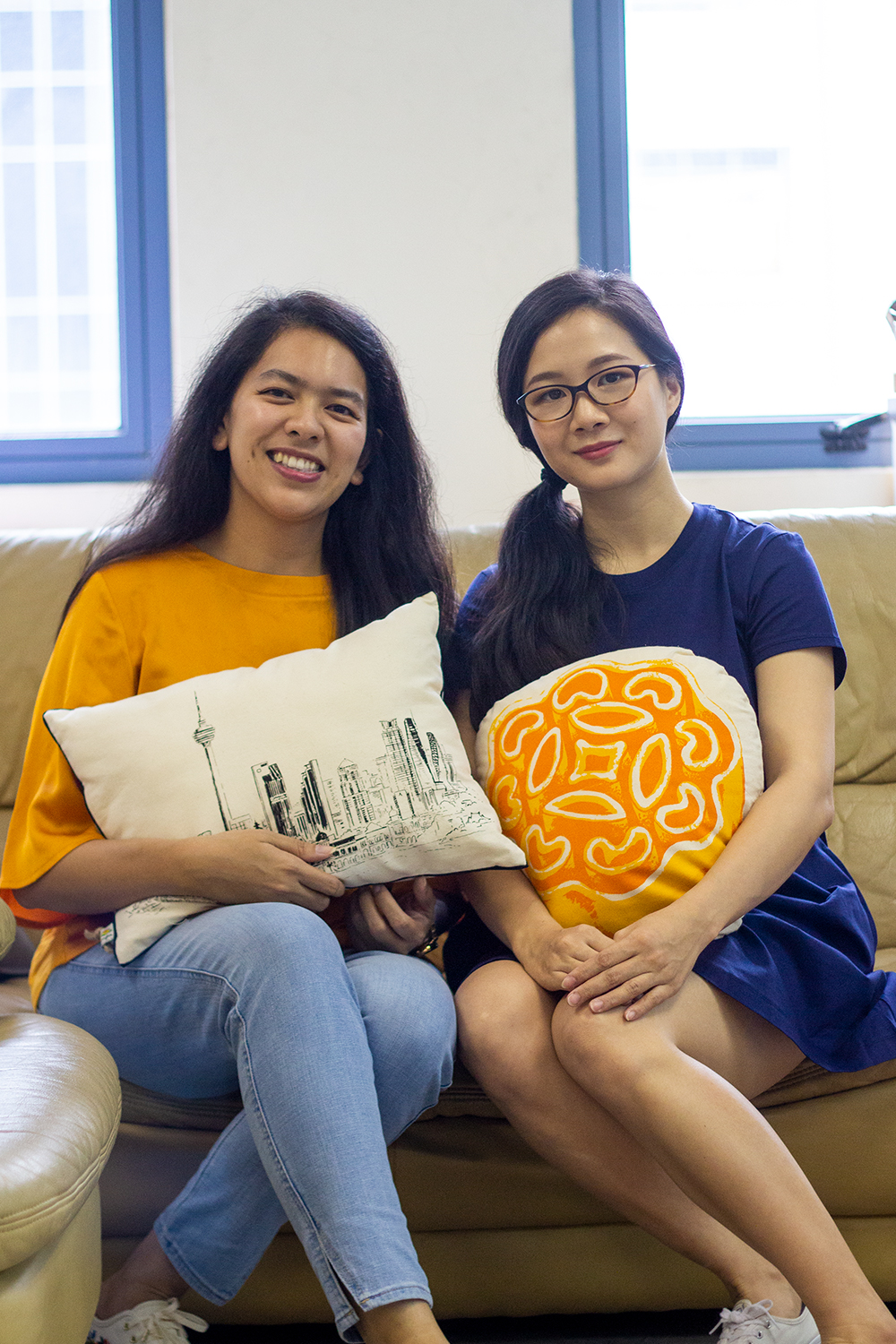
Towards a more resilient Malaysia
Bingka isn’t just about celebrating Malaysian pride, it also champions supporting Malaysians.
“Even when we first started out, we knew that our products had to be made in Malaysia because all our designs are based on our culture so it didn’t make sense to have souvenirs of Malaysia made anywhere else,” Emma contends.
This is why they made it a point to source and produce everything locally. In the initial years, this proved to be a challenge because the pair – together with fellow co-founder Ong Yi Lyn – had to manage everything from purchasing the materials to managing deliveries to customers all by themselves.
“We spent most of our five years focusing on our production because we had to get our supplies and materials in the quality and colours that we wanted them. And we had to find people who could make our products with the quality that we expect,” Emma explains.
“What we want to do is basically to keep our culture and heritage alive and bring it forward to the younger generation who may not really know or understand it.” – Adrihana Abdul Rashid
But maintaining a local supply chain has been a blessing in disguise during the MCO, as they were spared from shipments stuck overseas or at the docks in Port Klang – an issue faced by some of their friends in similar industries.
“Thankfully for us, we weren’t really affected and we could still go on with our productions. This is why we need to do things locally, so even if a pandemic were to happen, we can still move on,” Adrihana asserts.
Their long hours on product development and weekends spent promoting their brand presence at artisanal markets have also paid off – earning them loyal fans not just within the country, but also all around the world.
Now that they have scaled up to a point where they can outsource silkscreen printers, they are consciously looking to employ and empower the less fortunate.
“We have always been concerned when we read in the news about how there are unemployed people and underprivileged. We think that these people have skills and talents that are untapped, so it was something we wanted to try and support in our own way,” Emma shares.
“As a whole, we knew that when you support local, you become more resilient as a community and country,” she concludes.
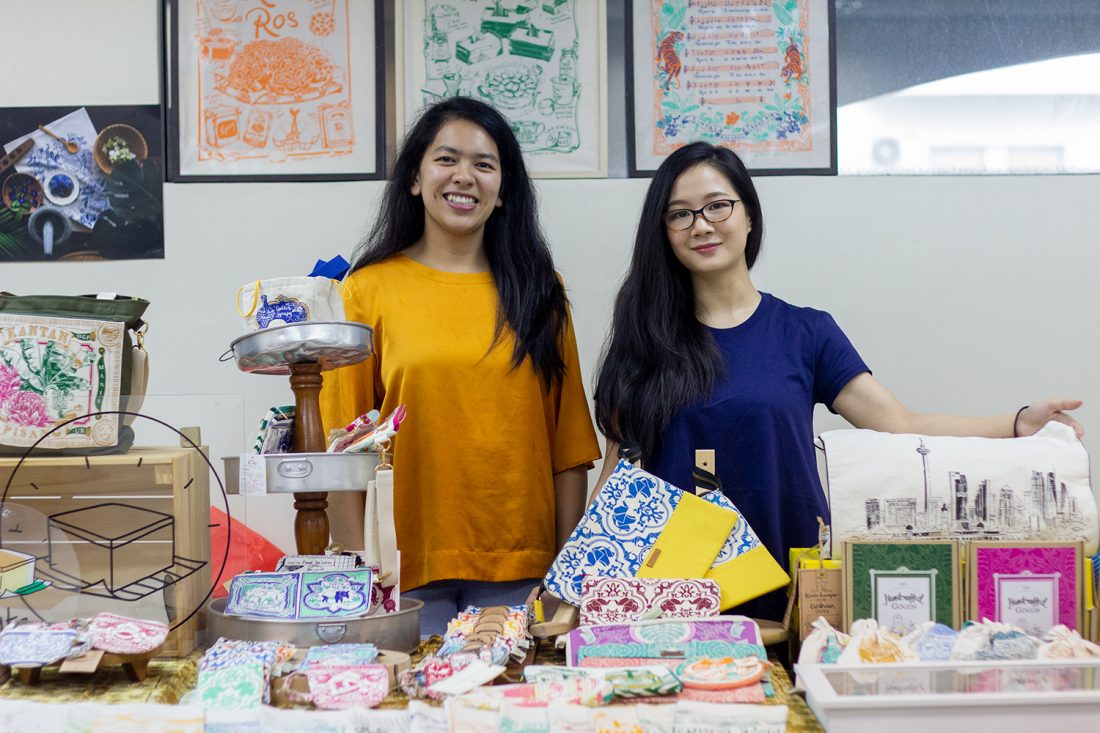 Shop Bingka’s collections on the official website here or follow the brand on Instagram (@bingka.kl) for more updates.
Shop Bingka’s collections on the official website here or follow the brand on Instagram (@bingka.kl) for more updates.
Photography: Anson Siau




